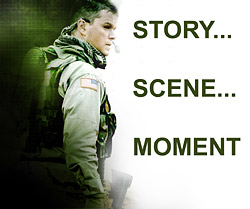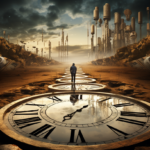 I was watching some deleted scenes for Green Zone the other day, when Matt Damon mentioned the principle of “Story, Scene, Moment” — when deciding which scenes to cut.
I was watching some deleted scenes for Green Zone the other day, when Matt Damon mentioned the principle of “Story, Scene, Moment” — when deciding which scenes to cut.
The comment was in reference to editing theory, but I thought it was equally applicable to screenwriting, and I had never heard it expressed so succinctly.
The theory is simple:
The story, as a whole, is more important than any one scene. And the success of a scene, as a whole, is more important than any one moment. So sometimes even brilliant moments or scenes have to be cut.
For example, one of the deleted scenes in Green Zone features a surprise car bombing that kills some Iraqi officials. It was an expensive and well executed scene, but in the context of the narrative it didn’t work. It muddied the story being told — which was one about the search for WMDs, not civil unrest in Iraq.
It was a great moment and a great scene, but it didn’t support the story, so it had to go.
Story, Scene, Moment — I think it’s a terrific hierarchy to keep in mind, during all phases of writing your script, especially when determining which of your darlings to kill. What do you think?
Trivia: The Director of Green Zone, Paul Greengrass (The Bourne Supremacy, The Bourne Ultimatum), used actual Iraqi war veterans as supporting actors and background troops, then improvised scenes using their guidance. This casting gave the action sequences an unparalleled level of authenticity.
Want me to read your screenplay? Please take a look at my script services.





This is a difficult concept to grasp.
But got it.
BTW – the green zone – a lean script with not style, a good thing, because the style is in the movie, not on paper. Tons of writers make this mistake, think their script is hot shit and flies off the page.
I find lots of writers write with style, eg – excess capitalization, dashes and colons, SOUND EFFECTS, and trying to be cool with cool sentences and irritating prose. Why don’t they write a f*********** novel istead. Very annoying. I ask all writers to read The Green Zone, to realize you style and cool writing and contest standings means nothing to the expert film director or the producers. Who cares if you won some script contests and overly chatty on some forums and conferences or facebook and you got unknown friends.
Sir, it’s a good thing you posted this. To home it in with a bat, get it together guys ……….. the
story is king, THE STORY IS KING, not your damn style, or cool style of writing… Please stop it and get a reality check.
Thanks,
Thanks for the note. Story is definitely king, but effective style is also important, especially for spec scripts (as opposed to shooting scripts).
It’s key to have great moments, great scenes and a great story for your script. All should flow together organically. And if they don’t, just remember the respective importance of each element, then rewrite or cut accordingly.